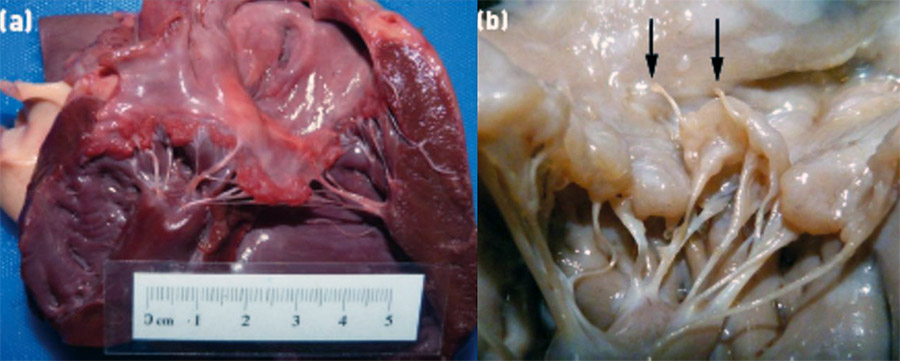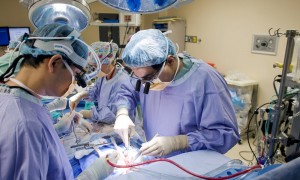The mitral valve is a small part of the heart, but it holds an important role in the blood circulation. When a condition such as myxomatous degeneration happens, the valve loses its ability to open and close properly, resulting in irregular blood flow or mitral valve regurgitation.
Knowing about this condition will help you to understand about your physiological function, especially if you have a specific heart condition.
Myxomatous refers to a noncancerous tumor filled with mucus, which can grow on various parts of your organ. Myxomatous degeneration happens when a certain part of the organ tissue is deteriorated, resulting in abnormalities and dysfunctions.
While the exact cause is still unclear, researchers think that dermatan sulfate build-up in the body is the possible culprit.
Dermatan sulfate is a beneficial cellular compound, aiding in the process of wound healing and blood coagulation.
However, when the production level is abnormally high, the compound can accumulate on connective tissues, like the mitral valve. The result is a thickened or enlarged tissue, which negatively affects its function.
How does myxomatous degeneration affect the function of the mitral valve? What can you do to reduce the negative impact? Read further to get references you can use while having a discussion with your doctor.
Effects of Myxomatous Degeneration on Mitral Valve
Myxomatous degeneration on the mitral valve is one of the most common causes of Mitral Valve Prolapse. This is the condition where the valve between the heart’s left ventricle and the left atrium is damaged. Since the valve regulates the blood flow during the pumping action, the damage can cause blood rush or backflow.
Some cases of Mitral Valve Prolapse are not life-threatening. The doctor may detect murmurs when they put a stethoscope on the patient’s chest, but otherwise, there are no serious harms. However, other cases may result in symptoms like palpitations, fatigue, and chest pain.

If the Mitral Valve Prolapse reaches a more dangerous level, it can cause serious health condition. Blood clots, congestive heart failure, endocarditis, and stroke are among the most common serious effects. The patient may need surgery to fix the valve condition if one of these conditions happen.
Types of Mitral Valve Surgery
Surgery is the only solution to treat Mitral Valve Prolapse caused by the degeneration of the mitral valve. There are two types of mitral valve surgery to fix its condition.
Annuloplasty
Annuloplasty is a procedure to tighten or reshape the annulus, which is a ring tissue that circles the mitral valve.
This procedure is done if the ring is enlarged due to myxomatous degeneration, causing mitral regurgitation or blood backflow. The surgeon will measure the size of the ring first before attaching a synthetic one.
Annuloplasty is considered a minimally invasive procedure, which can be done as open-heart surgery. The procedure includes small incisions, which heal faster.
Valvuloplasty
Valvuloplasty is a more invasive procedure than annuloplasty because it involves the insertion of a catheter. This procedure is done when the mitral valve becomes too thick and even fused, resulting in restricted blood flow during the pumping action.
Even if you don’t show severe Mitral Valve Prolapse symptoms, a doctor may still suggest this procedure if the valve is severely damaged.
This procedure includes the insertion of a “balloon catheter” into your artery, guiding it to reach the mitral valve. The doctor then inflates the catheter (hence the balloon part), which increases the valve passage and improves the blood flow.
You can undergo these treatments even without experiencing any symptoms. In fact, undergoing treatment before you show any troublesome symptoms will increase the chance for a better prognosis.
Preparations for Mitral Valve Surgery
Mitral valve surgery requires preparations to ensure a smooth procedure. There are several aspects of preparation you need to follow before undergoing the procedure.

Personal Items to Bring
Before heading to the hospital, make sure you bring the right personal items. Recommended things include:
- Comfortable outfits and underwear
- Toiletries (toothbrush, toothpaste, towel, comb, shaving equipment, tissue, facial soap)
- List of personal medications
- Hearing aids, dentures, or glasses (if you wear any)
- Required documents
- Copies of personal identifications
You can also bring something to calm your mind before surgery. Books, music player, puzzles, or stuffed animal are quite effective to help you relax.
Medications and Food Consumptions
Discuss with your doctor about things you can and cannot eat before surgery. You must also confirm when to start fasting to prepare for the surgery. The same thing applies to medications, especially if you have been regularly consuming certain medications.
You must also talk to your doctor about the list of medications you consume. If you have any allergies toward certain foods or medications, inform your doctor, relatives, or caregiver clearly. Make a list you can easily share or copy to keep everyone informed.
What Not to Wear during Surgery
Certain personal items will affect the surgery and even endanger your health. Make sure you don’t wear dentures, nail polish, contact lenses, glasses, and any jewelry during the surgery. If you wear studs, earrings, gauges, or other body modification accessories, remove them before surgery.
General Risks of Procedures
There are several common risks associated with mitral valve replacement or repair. They involve blood clots, bleeding, valve dysfunctions, and infection.
Stroke and death are very rare, and the possibilities are reduced with proper preparations. You probably experience slightly irregular heartbeats even after a successful surgery.
Your doctor will discuss this preparation and what to expect from the procedure. However, it is better to understand it so you can accept the doctor’s explanation better.
Foods and Drinks to Avoid
If you have myxomatous degeneration in the mitral valve, make sure to eat carefully. Certain foods and beverages are not recommended for people with problematic mitral valves. Here are some examples.

Alcohol
Alcohol is dangerous, especially if you experience overt symptoms of mitral valve prolapse. Alcoholic beverage can hinder the body’s “internal pacemaker”, which has a role in regulating the heartbeat and blood-pumping action. If this function is impacted due to alcohol consumption, you will experience more severe symptoms.
Alcohol can also induce a condition called cardiomyopathy, which injures heart muscles by dilation. If you have an abnormal mitral valve, cardiomyopathy will induce leaky valve and create more severe health risks.
Caffeine
Caffeine sources, such as coffee, tea, and dark chocolate, are stimulants that can affect the condition of your valve. Consuming caffeine while having an abnormal valve can result in palpitations.
Some people may even experience anxiety and panic attack symptoms due to increased and irregular heartbeats.
Sugary Foods and Beverages
Candies, fruit juice, and soft drinks contain a high amount of sugar that can trigger the mitral valve prolapse symptoms.
Your blood sugar level spikes after consuming sugary foods and drinks, which trigger the release of insulin and quickly reduce the blood sugar level again. The effects are symptoms like palpitations, shortness of breath, and even mild panic attack symptoms.
Soft drinks also contain artificial compounds such as aspartame. While it poses a small risk on healthy people, it can ruin your body’s ability to control the blood sugar level, resulting in severe symptoms on the heart valve.
Medications to Avoid
People with myxomatous degeneration on their heart valves must also avoid certain medications. They can disrupt the blood pressure level and blood pumping rhythm, resulting in severe symptoms.
Decongestants
Decongestants—common solutions for cold and flu symptoms—often contain active ingredients, such as phenylephrine and pseudoephedrine. They can stimulate the central nervous system and increase blood pressure. The results are chest paint and palpitations.
Over the Counter Painkillers
Over the counter painkillers, like ibuprofen and aspirin, have a blood-thinning effect. It will encourage the body to increase the fluid production level, resulting in higher blood pressure.
The result is a faster bloodstream that goes through the damaged valve. It will cause symptoms like palpitations, angina, and chest pain.
Herbal Supplements
Avoid taking herbal supplements that work as stimulants. They will encourage the stream of the blood through the valve, resulting in heart-related symptoms.
Herbs that are deemed dangerous for people with damaged heart valves include ginseng, fenugreek, echinacea, St. John’s Wort, alfalfa, and gingko biloba.
Conclusion
Mitral Valve Prolapse is caused by the abnormal condition of the mitral valve, which regulates the blood pumping action in the left chambers of the heart.
Myxomatous degeneration is one of the common causes of abnormal valves. While procedures such as valve replacement or repairment can fix it, remember that it is only temporary. You need to regulate your lifestyle and be cautious with medications to keep the heart healthy.




Leave a Reply